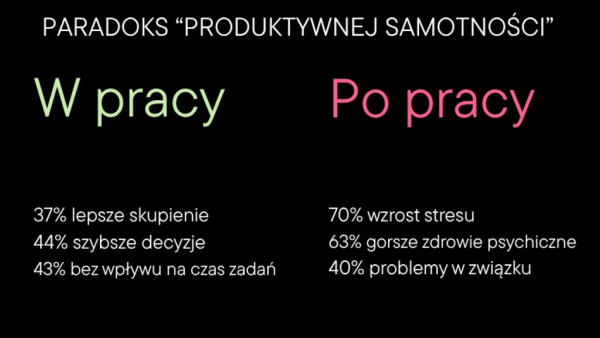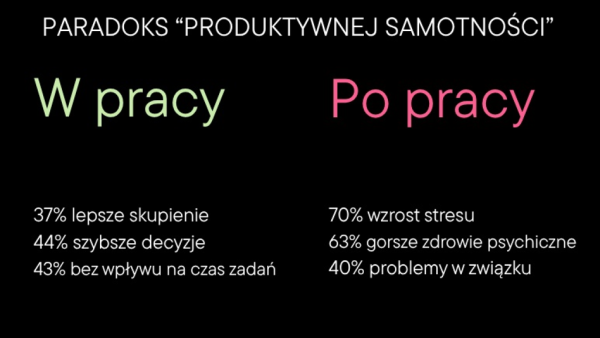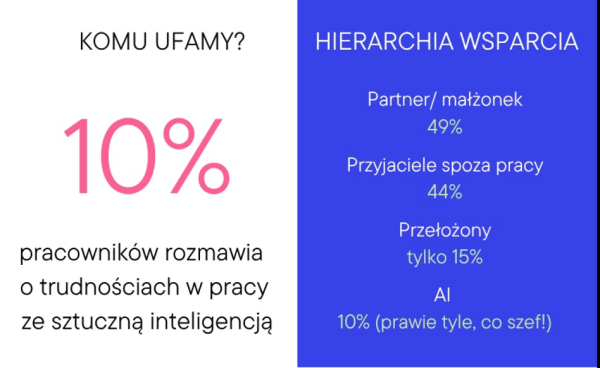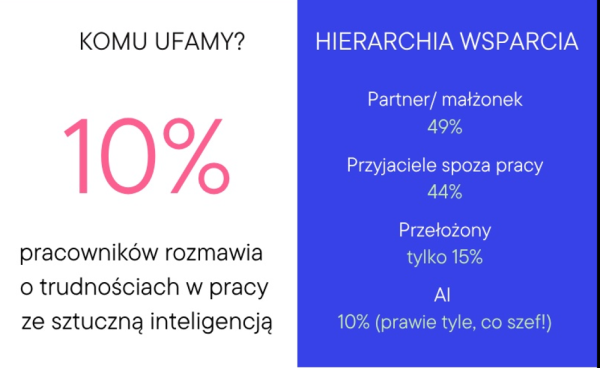As many as 82% of white-collar workers in Poland experience loneliness at work, and 10% of them are trying to solve this problem with artificial intelligence, according to the report “Professional Loneliness: When AI Becomes a Close One at Work.” We asked psychologists how to best cope with loneliness in the workplace and whether using new technologies is a good idea to feel better.


According to the report “Professional Loneliness: When AI Becomes a Close Relationship at Work,” developed by Symetria, this phenomenon affects employees regardless of their work model—hybrid, on-site, or remote. Among the groups most at risk of isolation are:
- specialists underestimated by their environment (58% work on-site)
- people who are “culturally and linguistically alienated” (55% work hybridly)
- “newcomers on the sidelines” (14% work remotely).
Advertisement See also: Take part in our stock market multi-thlon! Disciplines: sprint for stocks, dive into ETFs, and push your wallet for the prize.
Only 15% of respondents report their problems to their supervisor. Reasons include a lack of real contact with their boss (20%) and a feeling that their opinion doesn't matter (22%).
The study reveals that loneliness stems not only from relationships but also from the structure of organizational structures. Employees lacking agency—functioning within rigid hierarchies (37%) and with no real influence on their development (33%)—are more likely to experience feelings of isolation and alienation.
100 Years of Solitude
According to Buldogjob experts, lone workers face many painful consequences in the workplace. They say these include:
- feeling of alienation
- being overlooked in promotions and bonuses – single people rarely boast about their achievements, so they disappear in numerous company projects
- more work – since they are good at many tasks, they can do more than those who complain
- more stress – they get less support from the team or boss, and communication problems only deepen this problem
- jealousy of co-workers – difficult contacts with the team may cause a false impression regarding the working conditions, real duties or the employee's salary
- pressure resulting from the feeling of “irreplaceability” – if an employee is given the hardest tasks, it means that others will not necessarily cope with them
- lowered self-esteem .
The company also loses from employee alienation.
According to Joanna Marszalska, a business psychologist, trainer and manager, employee loneliness also brings real losses to the employer.
” A lonely person's commitment to work decreases, and the tasks they perform are of lower value . Such employees are often withdrawn and don't take on tasks that require commitment and creativity because they need support,” Joanna Marszalska tells Bankier.pl. “Loneliness can also easily lead to depression, and it's difficult to work when sick, so ultimately, the company loses the employee.”
According to the psychologist, lonely people often become too involved in their work to avoid feeling so isolated and try to build their self-esteem on it.
“Most often, their professional lives become so consuming that they don't have time to reflect on their problems. While this may initially appeal to employers, it can lead to burnout. Therefore, the most valuable employee for a company is one who can build relationships with others, including members of the team they work with,” adds Joanna Marszalska.
However, while loneliness has many negative consequences, the report also reveals its complex nature. As many as 37% of respondents say that solitude helps them focus, and 44% say it positively impacts their decision-making speed. However, in the long term, isolation limits creativity, collaboration, and engagement.


photo: Symetria / Bankier.pl
Will AI come to the rescue?
Meanwhile, it appears that in the face of the deepening crisis of loneliness in the workplace, technology, rather than humans, is starting to play an increasingly important role in employees' professional lives. One in ten people (10%) admits to talking to AI about their feelings of loneliness. For many, it is becoming a “safe confidante” – neutral, immediately accessible, and free from judgment.


photo: Symetria / Bankier.pl
“This is a fundamental change. Technology is beginning to serve as an emotional support system. It offers anonymity, acceptance, and immediate accessibility, which are often lacking in interpersonal relationships in companies,” says Szeran Millo, CEO of Symetria.
According to Symetria representatives, the growing role of artificial intelligence as a substitute for human contact is not just a technological curiosity, but a symptom of a deep crisis of trust and communication in Polish organizations. According to their report, employees are increasingly bypassing formal support channels – 31% indicate a lack of effective communication paths, and 29% indicate a lack of someone with whom they can discuss private matters. The study shows that AI, while it won't replace interpersonal relationships, often becomes a “first step” – a safe attempt at conversation before an employee decides to reach out for real help. For many, it's also the only available alternative – neutral, always ready to “listen.”
Just have a coffee together at work
According to Dr. Malwina Puchalska-Kamińska, a psychologist at SWPS University in Sopot, alternative methods of dealing with loneliness also have value .
“They certainly allow you to find valuable forms of support. They also provide professional answers, but there won't be a human being on the other end who shares their own emotions and genuine empathy,” Dr. Malwina Puchalska-Kamińska tells Bankier.pl. “Meanwhile, face-to-face contact offers much more than chat.”
According to the scientist from SWPS, having a friendly person in the workplace is very important.
“It doesn't have to be a friend right away, but someone you can grab a coffee with in the kitchen between tasks and simply chat with,” says Dr. Malwina Puchalska-Kamińska. “To avoid feeling lonely at work, it's also worth establishing contacts yourself and taking an interest in the needs of others. Then, support works both ways.”
Ordinary human care is needed
According to the authors of the report, “Professional Loneliness: When AI Becomes a Close Relationship at Work ,” technology isn't competing with humans so much as bridging the gap where relationships fail . Artificial intelligence is becoming the answer to the deficit of empathy and openness in organizations.
“Lack of trust, poor communication, and a sense of unimportance cause employees to adopt a strategy of avoidance. In such an atmosphere, AI tools become the remedy, which they personify, treating them as friendly companions who “understand” their emotions,” explains Justyna Jędrkowiak, co-founder of Workspoty and participant in the qualitative part of the study. “This may provide temporary relief, but it doesn't solve systemic problems at work. Without conscious effort from leaders, we won't build engaged teams—regardless of the work mode,” the expert concludes.






